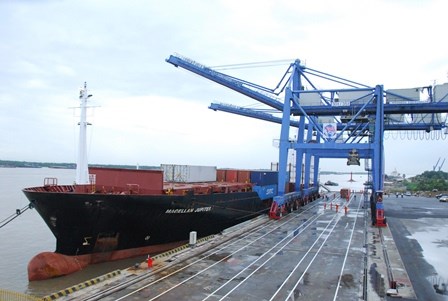For the last decade, the city has focused on land transport in an aim to tackle traffic congestion, especially at the entrances to the city and its ports.
A number of projects to expand road networks were completed, but did not ease traffic congestion, especially at the Northwest gateway and the entry to Cat Lai Port, transport experts said.
Bui Xuan Cuong, director of the Department of Transport, said the city last year built 106km of roads and 21 bridges.
Vo Kim Cuong, former deputy architect of Ho Chi Minh City, said that rapid urbanization was one of the main causes behind the overloaded streets.
    |
 |
|
Cat Lai Port. Photo: baogiaothong.vn |
The inappropriate locations of ports have also caused pressure to existing road networks.
Cuong said the city’s agencies should use the waterways to ease pressure on the city’s roads.
Ha Ngoc Truong, chairman of the Ho Chi Minh City Association of Bridges–Roads–Ports, said the city’s port network has not been fully developed due to the lack of connections between ports and city infrastructure.
Government agencies have focused on the development of land transport while waterway transport received meager investments, said Truong.
Nguyen Ngoc Tuong, deputy chief of Ho Chi Minh City Traffic Safety Board, said the only way to reduce traffic congestion at roads and entries around ports is to improve waterway transport.
Pham Sanh, a transportation expert from Ho Chi Minh City, said the waterway network was still not connected to roads, railroads, and the port network.
Moreover, the clearance height of most bridges in Ho Chi Minh City is too low while canals are not frequently dredged and have low depth, making them inaccessible for large vessels.
“To develop water transport in Ho Chi Minh City, agencies must build a suitable plan for infrastructure development, especially for waterways connecting Ho Chi Minh City with the Mekong Delta region,” said Sanh.
Ho Chi Minh City agencies said that between 2018 and 2020 the city would mobilize investments from the private sector into water transport infrastructure.
For example, in 2018, upgrades of Binh Loi Bridge in Binh Thanh district will be completed, paving the way for waterway transport from Tay Ninh and Binh Duong provinces with ports in Ho Chi Minh City and Cai Mep ports in Ba Ria – Vung Tau province.
Dredging of canals will help link the Saigon River with the Dong Nai River.
Canals and rivers on Vam Co Dong, Cho Dem, Ben Luc, Rach Doi and Kinh will be dredged, while Ong Nhieu, Rach Dia and Rach Doi bridges will be upgraded to facilitate passenger and cargo transport from Ho Chi Minh City to Long An and Tay Ninh provinces.
Ports and piers along the Saigon River will be moved to suburban areas, while wharves along Dong Nai, Nha Be and Thi Vai rivers will be completed and upgraded.
Truong Tho ICD (Inland Container Depot) will be relocated and upgraded.
A six-ha river port, to be built in a hi-tech park, will be able to take 1,000 ton vessels.
City authorities will have plans to add new routes to connect Vam Co River with ports in Cai Mep – Thi Vai area, and to link Dong Nai with Thi Vai rivers.
More ICDs will be built to help reduce the pressure on land transport facilities.
To meet the rising demand for passenger transport, the transport department has approved an 18ha passenger port with a 600m pier at Den Do Cape in District 7, according to Pham Cong Bang, head of the waterway transportation management division under the department.
The developer is completing the pre-feasibility study for the passenger port and will submit it to city agencies for approval, said Bang.
Source: VNA